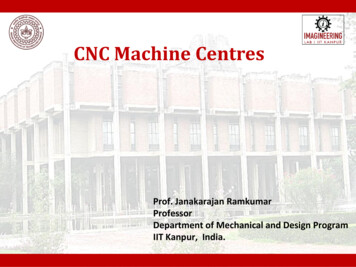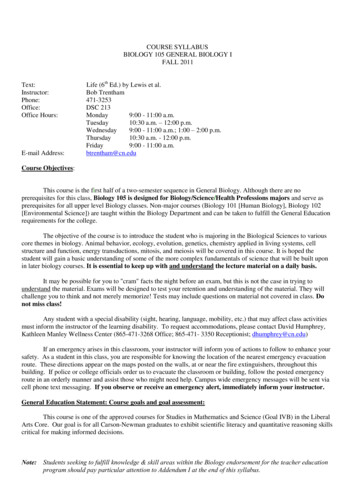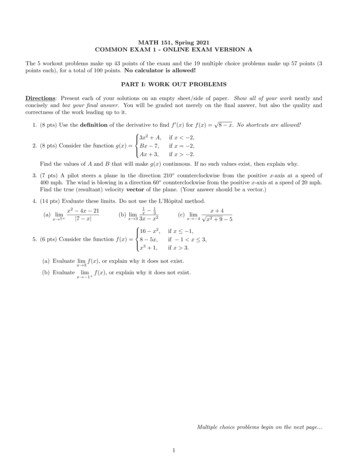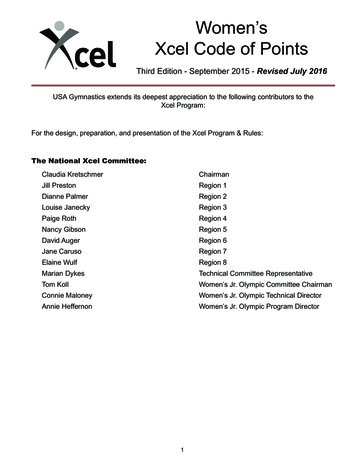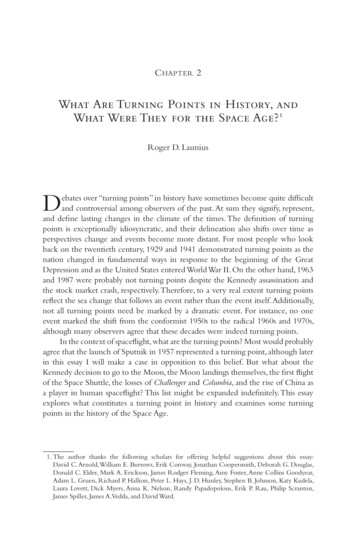
Transcription
c hapter 2What Are Turning Points in History, andWhat Were They for the Space Age? 1roger D. LauniusDebates over “turning points” in history have sometimes become quite difficultand controversial among observers of the past. at sum they signify, represent,and define lasting changes in the climate of the times. the definition of turningpoints is exceptionally idiosyncratic, and their delineation also shifts over time asperspectives change and events become more distant. For most people who lookback on the twentieth century, 1929 and 1941 demonstrated turning points as thenation changed in fundamental ways in response to the beginning of the greatDepression and as the united States entered World War ii. on the other hand, 1963and 1987 were probably not turning points despite the Kennedy assassination andthe stock market crash, respectively.therefore, to a very real extent turning pointsreflect the sea change that follows an event rather than the event itself.additionally,not all turning points need be marked by a dramatic event. For instance, no oneevent marked the shift from the conformist 1950s to the radical 1960s and 1970s,although many observers agree that these decades were indeed turning points.in the context of spaceflight,what are the turning points? most would probablyagree that the launch of Sputnik in 1957 represented a turning point, although laterin this essay i will make a case in opposition to this belief. But what about theKennedy decision to go to the moon, the moon landings themselves, the first flightof the Space Shuttle, the losses of Challenger and Columbia, and the rise of china asa player in human spaceflight? this list might be expanded indefinitely. this essayexplores what constitutes a turning point in history and examines some turningpoints in the history of the Space age.1. the author thanks the following scholars for offering helpful suggestions about this essay:David c. arnold,William e. Burrows, erik conway, Jonathan coopersmith, Deborah g. Douglas,Donald c. elder, mark a. erickson, James rodger Fleming, amy Foster, anne collins goodyear,adam L. gruen, richard p. hallion, peter L. hays, J. D. hunley, Stephen B. Johnson, Katy Kudela,Laura Lovett, Dick myers, anna K. nelson, randy papadopolous, erik p. rau, philip Scranton,James Spiller, James a.Vedda, and David Ward.
20SocietaL i mpact oF SpaceFLightDefining a Turning Pointin a recent search of amazon.com for the words “turning point” in the titles ofbooks, i found 1,134 relevant titles.these ranged from The Turning Point: Jefferson’sBattle for the Presidency by Frank van der Linden to The Higher Freedom: A NewTurning Point in Jewish History by David polish, to The Right Moment: Ronald Reagan’sFirst Victory and the Decisive Turning Point in American Politics by matthew Dallek.2and the term is hardly new. hoffman nickerson used it in 1928 to describe thebattle of Saratoga during the american revolution.3 postmodern scholars such asFritjof capra have employed it as well.4 it appears in historical work of all typesand varieties, schools and subjects, and grade levels and sophistication. indeed, theconcept of a turning point is ubiquitous in the literature of history. and not justin the written word—professors, pundits, politicians, and plebeians all use it in allmanner of settings and circumstances. many course offerings at the nation’s collegesand universities include “turning point(s)” in their titles.at a core level, a turning point may be defined as an event or set of eventsthat, had it not happened as it did, would have prompted a different course inhistory. Dictionaries define it as “a point at which a significant change occurs.”5the classic youngster’s encyclopedia, World Book, defines it as “a point at which anotable or decisive change takes place; critical point; crisis:the Battle of gettysburgwas a turning point in the civil War.”6 the use of the term comes up in the mostinteresting places. Encyclopædia Britannica incorporates 560 entries in which theterm is used. not so unusual is the statement that the Battle of midway “markedthe turning point of the military struggle between” the united States and Japan in1942, and “the year 1206 was a turning point in the history of the mongols and inworld history: the moment when the mongols were first ready to move out beyondthe steppe.”7 more obtuse are such interpretations as the death of antiochus in 129Bc marking “a turning point in the history of the eastern mediterranean: greco 2. Frank van der Linden, The Turning Point: Jefferson’s Battle for the Presidency (golden, co: Fulcrumpublishers, 2000); David polish, The Higher Freedom:A New Turning Point in Jewish History (chicago:Quadrangle Books, 1965); matthew Dallek, The Right Moment: Ronald Reagan’s First Victory and theDecisive Turning Point in American Politics (new York: Free press, 2000).3. hoffman nickerson,the Turning Point of the Revolution; or, Burgoyne in America (new York: houghtonmifflin, 1928).4. Fritjof capra, The Turning Point: Science, Society, and the Rising Culture (new York: Simon andSchuster, 1982).5. “turning point,”merriam-Webster online 0point(accessed 21 august 2006).6. World Book encyclopedia and Learning Sources, http://www.worldbook.com/wb/dict?lu turning%20point(accessed 21 august 2006).7. “midway, Battle of,” encyclopædia Britannica online, http://search.eb.com/eb/article-9052586?query turning%20point&ct eb (accessed 21 august 2006); “genghis Khan,” encyclopædia Britannicaonline, http://search.eb.com/eb/article-41207?query turning%20point&ct eb (accessed 21 august 2006).
What are Turning Points in History, andWhat Were They for the Space Age?21macedonian domination received a decisive blow; it would survive for only 46more years.”8 tying the demise of greek domination nearly two generations later tothe death of antiochus seems tenuous at best.From a sociological perspective, a turning point represents a lasting shift inthe zeitgeist or “spirit of the age.” Several ingredients must be present. the shockto the system of civilization is profound and it may be measured in several ways.according to sociologist ted goertzel, one of the most reliable indicators is theresponse of the financiers. “Financial markets are one of the quickest and mostsensitive indicators of a country’s mood,” he noted.“panic can move quickly after ashock . . . and markets can spiral out of control.” public opinion polls may also takethe temperature of the society and its reaction to some major event,9 but those willwork only for recent events where the data and structures that goertzel understandsare available. clearly, there is no manner in which the mongol invasions of genghisKahn, the death of antiochus, or even the Battle of midway can be assessed usingfinancial data and public opinion polls.political scientists would employ analytical models such as Frank Baumgartner’sand Bryan Jones’s punctuated equilibrium analysis, which suggests that the policyprocess is comprised of long periods of stability that are then interrupted bypredictable periods of instability which lead to major policy changes. Baumgartnerand Jones describe “a political system that displays considerable stability with regard tothe manner in which it processes issues, but the stability is punctuated with periods ofvolatile change.” in times of stability the public is limited in its ability to effect changeto the overall system, and most people are not even focused on making changesbecause they are relatively content with the current situation. only in times of uniquecrisis and instability do enough members of society rise up to undertake fundamentalchange, often from a perceived threat or dramatic event.10 a turning point, therefore,results from a punctuation in the equilibrium of everyday life.this theory—clinicaland sterile as it might actually be—has been applied to all manner of decisive eventsin history and is consistently reaffirmed in the discipline of political science.other social science disciplines approach the issue of marked change indifferent ways and with differing analytic tools, but all, it seems, recognize a turningpoint in the stream of time as little more than an artificial construct that facilitatesinterpreting dramatic changes in society. indeed, it seems as subjective a term as“scientific revolution” was for thomas Kuhn, who defined it as a “noncumulativedevelopmental episode in which an older paradigm is replaced in whole or in part8. “iran,ancient,” encyclopædia Britannica online, http://search.eb.com/eb/article-32135?query turning%20point&ct eb (accessed 21 august 2006).9. ted goertzel, “September 11, 2001: a turning point for america’s Future?” undated paper inpossession of author.10. Frank r. Baumgartner and Bryan D. Jones, Agendas and Instability in American Politics (chicago:university of chicago press, 1993), pp. 3–24; Frank r. Baumgartner and Bryan D. Jones,“agendaDynamics and policy Subsystems,”the Journal of politics 53 (november 1991): pp. 1044–1074.
22SocietaL i mpact oF SpaceFLightby an incompatible new one.”11 as with “scientific revolution,” assigning turningpoint status to an event is very much up to the individuals analyzing it and itseffects. indeed, people at the time may well not recognize a turning point as such.as historian erik rau remarked:[h]istorians today think of the Battle of Saratoga as a turning pointin the history of the american revolution, but many at the timewould have had no reason to believe this.this makes the turningpoint of Saratoga no less real to us in understanding Saratoga,but it may not have influenced very many people’s behavior onthe ground at the time.You can’t see Saratoga as a turning pointuntil after the war is over and you take stock of what happened.aturning point is ultimately a construct of historical reflection, anda historical unit of analysis, rather than an event that reveals itselfto the people living through it at the time.12another analogous term that has gained credence in recent years is thesingularity-rooted balance of equations, which is now applied far beyond its originalapplication and is a statement of the power of nomenclature in modern society.again, there is no firm definition acceptable to all.13of course, when considering turning points in history we are treading a pathwell-worn by earlier historians, some of whom were illustrious in their own time andstill evoke hushed tones of reverence in seminars on historiography.at sum, the issue ofa turning point in history is really about assigning significance to historical events, andmany in this profession have pondered this problem.carl L.Becker,for one,explored thisin his seminal paper,“What are historical Facts?” first presented at the research clubof cornell university on 14 april 1926. using as an example Julius caesar’s crossing ofthe rubicon in 49 Bce, Becker argues that we have chosen to single this out and assignit significance, indeed marking it as a turning point in roman history. Why? manyothers had crossed the rubicon at many other times, yet they are unremembered.Whyis caesar’s crossing in the year 49 Bce significant? only considered in the context ofwhat were the significant results of his entry into rome may we begin to explore thisevent.and considered in relation to the web of interconnection, it is actually a symbolstanding for the historical record—a convenient shorthand—that allows us to explainsignificance. Becker reasoned that any “historical fact is not the past event, but a symbolwhich enables us to recreate it imaginatively.”1411. thomas h. Kuhn, The Structure of Scientific Revolutions (chicago: university of chicago press, 1962), p. 92.12. erik p. rau e-mail to author,“turning points in history,” 17 august 2006, copy in possession of author.13. a noncosmological use of this term may be found in ray Kurzweil, The Singularity Is Near:WhenHumans Transcend Biology (new York:Viking, 2005).14. carl L. Becker, “What are historical Facts?” in Detachment and the Writing of History: Essays andLetters of Carl L. Becker, ed. phil L. Snyder (ithaca, nY: cornell university press, 1958), pp. 41–64;quotes from pp. 45–46.
What are Turning Points in History, andWhat Were They for the Space Age?23Becker traveled into similar territory in his presidential address before theamerican historical association in 1931, where he declared “everyman his ownhistorian.” he asserted that history is an artificial extension of memory and “inthis sense is story, in aim always a true story; a story that employs all the devices ofliterary art (statement and generalization, narration and description, comparisonand comment and analogy) to present the succession of events in the life of man,and from the succession of events thus presented to derive a satisfactory meaning.”he added that “in every age history is taken to be a story of actual events fromwhich a significant meaning may be derived.”15 turning points in history are allabout assigning significance to events of the past, and they are exceptionally slipperyand idiosyncratic to the individuals assigning that significance. at the same time,some historians handle this issue with style and grace and aplomb.one example of the difficult task of assigning significance to events will suffice,and the process will conjure an image of a turning point.at the five-year anniversaryof the 11 September 2001 attacks on the World trade center and the pentagon, mostpeople would probably consider this instance as a clear point of demarcation in whichthe trajectory of the world as we understood it shifted appreciably. in the aftermathof 9/11, feelings of insecurity at home and hysteria in Washington abounded. majorchanges in governmental policies and partisan politics resulted.a sense that the nationas a superpower might be at risk abounded and the response needed to be swift anddecisive. military action resulted, some of it taking a course unanticipated by thoseplanning it.there were hearings and finger-pointing, and floodgates of governmentfunding opened for all manner of presumed security-enhancing programs andintelligence specialists. additionally, president george W. Bush was criticized for the9/11 attacks and his failure to prepare for such an eventuality.16But is it appropriate to view 9/11 as a turning point?” at one level, perhaps,but some have argued that this event was simply one chapter of a much longer story.as cambridge university historian Brendan Simms recently commented:Without the attacks on the World trade center and the pentagon,we may say with a reasonable degree of confidence that airlinetravel would have been easier. But beyond that, it becomesdifficult to speculate. Some sort of attempt to topple husseinwas brewing in any case. oil prices would still have risen giventhe increase in global, particularly chinese and indian, demand.the iranian nuclear issue would be equally acute. and needlessto say, the issue of palestine would still be with us.15. carl L. Becker, “everyman his own historian,” American Historical Review, 37 (January 1932): pp.221–236, quote from 231–232.16. this includes everything from such polemics as gore Vidal, “the enemy Within,” The Observer(London), 27 october 2002, to more the reasoned analysis of the national commission onterrorist attacks upon the united States, The 9/11 Commission Report (Washington, Dc: u.S.government printing office, 22 July 2004).
24SocietaL i mpact oF SpaceFLightSimms agrees with former chinese premier Zhou en-lai’s quip about thesignificance of the French revolution: it is too early to tell.17Likewise, rutgers university sociologist ted goertzel questions 9/11 as aturning point in history. he cites polls suggesting that u.S. attitudes were mostlyunchanged by the attacks and that efforts to return to normalcy motivated manypeople affected. he found that “the stock market recovered quickly from the shockof 9/11” and that the “domestic political climate does not seem to have shifted.”in only one major area did goertzel find a significant shift in national perspective,noting that the “country’s foreign policy mood has shifted from introverted toextroverted.” indeed, he found that the following major elements remained firmboth before and after 9/11: american military hegemony is strong; the stock market recovered from its initial shock; america is firmly in an extroverted foreign policy mood; and Western “sensate” popular culture seems irresistible.For goertzel, 9/11 as a turning point is more nuanced and not nearly asstraightforward as many have suggested.18With the foregoing discussion,it appears that turning points in history resembleso many other constructs in history, such as periodization, dialectic, causation, andsignificance, in their lack of firm definition. undoubtedly, however, they are part ofthe toolbox used by historians and they appear throughout the master narrative ofhuman history. Since turning points in history seem remarkably similar to beauty(that is, they exist in the eye of the beholder, thereby demonstrating the need forsagacious historians), do they still offer useful frames of reference for historical study?i asked several friends, colleagues, fellow travelers, and critics to offer their thoughtson turning points in space history, and what i received was a remarkable set of broadobservations. many of the ideas presented proved remarkably reflective and somewere profound.as Dick myers observed,“Like so many things in our existence, thedefinition depends upon the context . . . i think that one defines it in the concrete,not the abstract.” in considering the histories of the space age, historians workingin this arena have the power to define turning points however they wish.they will“be unique to that topic . . . [and] are defined by the context in which they occur orare said to occur—the context in which historians, etc. are explaining and analyzingand trying to understand.”1917. Brendan Simms, “9/11: historic turning point, or Bump in the road?” Los Angeles Times, 10September 2006.18. adam clymer,“u.S.attitudes altered Little by Sept. 11, pollsters Say,” New York Times, 20 may 2002;ted goertzel,“9/11 as a turning point in history,” undated powerpoint presentation in possessionof author.19. Dick myers e-mail to author,“turning points in history,” 16 august 2006, copy in possession of author.
What are Turning Points in History, andWhat Were They for the Space Age?25historian philip Scranton carried this line of thinking a bit further. hesuggested that there might be multiple framings of historical turning points:[F]irst from the perspective of contemporary actors (thenrefracted through the longer term assessments of historians—hence Sputnik was a major break for those working in theworld of 1957–58, but not so big a deal fifty years on) andalternatively, the turning points historians construct in theirnarratives and periodizations, years or events which may nothave seemed such a big deal to the folks at the time. once in awhile (i’d try 1968) both actors and historians agree that there’sa major shift that’s been launched.that frames a third, probablypretty small, category.20art historian David Ward offered an additional thought on this subject. henoted that the concept of turning points had value for political, diplomatic, military,and economic history, but was much less useful in social and other types of history.as Ward commented, it would be “rather hard to pin down the moment whenmodernism [in art] arrived.”21Deborah g. Douglas criticized the concept of turning points in history andsuggested that they represent[ . . . ] the spaces/places in time that the historical communityfeels it has some fundamental understanding of and cantherefore use in analysis and, more importantly, in our narratives.Depending on your disciplinary point of view, you may findyourself attracted or repelled by the particular term turningpoint but i suspect that has more to do with the time scale ofyour study and your literary tastes.22She allowed that “the concept is popular but it is also formulaic and didactic—too amateurish, really—for good writers and readers.”turning points are also representative of the dominant culture in whichthey are situated. For example, how would noted marxist historian howard Zinninterpret the turning points usually associated with the twentieth century? hiswarning is apropos in this context: “there is an underside to every age aboutwhich history does not often speak, because history is written from records leftby the privileged. We learn . . . about the thinking of an age from its intellectualelite.”23 moreover, how would a Vietnamese scholar approach a history of the20. philip Scranton e-mail to author,“turning points in history,” 17 august 2006, copy in possessionof author.21. DavidWard e-mail to author,“turning points in history,” 21 august 2006, copy in possession of author.22. Deborah g. Douglas e-mail to author, “turning points in history,” 16 august 2006, copy inpossession of author.23. howard Zinn, The Politics of History (Boston: Beacon press, 1970), p. 102.
26SocietaL i mpact oF SpaceFLight1960s or, more to the point, a how would a chinese scholar focusing on aerospacehistory? the reality is that turning points lack clear cohesion across a broadspectrum. graphically demonstrating the lack of clear definition and meaning ofa turning point, Douglas suggested a game:assemble on cards a large number of events that might be consideredturning points in space history. Shuffle the deck, pick 10 at random,and spend 5 minutes making up a story.Do it again a couple of timesand compare your stories.are you fitting your ‘turning points’ intoyour preconceived narrative or do you have vastly different stories?24this approach might yield really interesting results and is grist at least for a sessionat one of the major historical conferences.Despite the ease with which we might appropriately dispense with turning pointsas a useful analytical tool in history, they are everywhere in the national discourse. intwentieth-century america, events commonly assigned turning point status includethe following, ranked by opinion leaders in a poll conducted in 1999.Top 25 News sTories of The TweNTieTh CeNTury251U.S. drops atomic bomb19452Men first walk on the Moon19693Japan bombs Pearl Harbor19414Wrights fly first airplane19035U.S. women win the right to vote19206JFK assassinated in Dallas19637Nazi Holocaust exposed19458World War I begins19149Court ends “separate but equal”195410U.S. stock market crashes192911Antibiotic penicillin discovered192812DNA’s structure discovered195313Soviet Union dissolves199114President Nixon resigns197415Germany invades Poland193916Communists take over Russia191717Ford creates assembly line191318Soviets launch first satellite195719Einstein conceives relativity190520Birth control pill OK’d by FDA196021New polio vaccine works195322Hitler named chancellor193323M. L. King, Jr., assassinated196824Allies invade France on D-Day194425Deadly AIDS disease identified198124. Douglas e-mail to author,“turning points in history,” 16 august 2006.25. “Stories of the century, 1900-2000,” newseum, cessed 13 September 2006).
What are Turning Points in History, andWhat Were They for the Space Age?27For the period since 2000, almost certainly the 2001 terrorist attacks on theWorld trade center and the pentagon and the 2003 invasion of iraq would beassigned important status as turning points in history.the reality is that accepting all of these events, as significant as many are,as turning points demonstrates the less than useful nature of the term. certainevents are immediately considered turning points, such as pearl harbor and theatomic bomb, whereas others are assigned this status only in retrospect, such as thestock market crash and the oil embargo.turning points of national significanceprobably take place less often than this list suggests, and the probability thatany individual would witness more than a handful of them during his or herlifetime is small. instead, the 25 events listed here are within the memory ofmany people still alive, and even those of us a little younger can remember morethan dozen of them.Constructing Turning Pointsin Space Historyrather than playing the game as outlined by Debbie Douglas, let me suggestsome turning points in the history of spaceflight. i will then analyze three of them,“turning” the concept on its “pointed” head: 1) a recognized turning point which iwill argue might not be one after all; 2) an event not usually thought of as a turningpoint but which i will assert is appropriately considered one; and 3) an event thatwas immediately labeled a turning point at the time it took place but, as time passes,appears much less so than previously thought.Based on inputs from several close observers of the history of spaceflight, majorturning points in the field may include the following:1.robert goddard’s first liquid-fueled rocket (1926).2.Development of ballistic missiles (1944).3.Launch of Sputnik (1957).4.Flight of Yuri gagarin (1961).5.JFK’s announcement of apollo landing decision (1961).6.Launch of the first operational applications satellites (1962).7.apollo 11 lunar landing (1969).8.nixon’s Space Shuttle decision (1972).9.First flight of the Space Shuttle (1981).10.Challenger accident (1986).11.Demise of the Soviet union as competitor in space (1991).12.Decision to turn the Space Station into a multinational program involvingrussia (1992).13.Columbia accident (2003).14.Bush’s announcement of the Vision for Space exploration (2004).15.Flight of SpaceShipone (2004).
28SocietaL i mpact oF SpaceFLightWhat is most interesting about this list, compiled from inputs from manysources, is the lack any mention of planetary exploration or earth science, and onlya passing reference to applications satellites. most are also political turning points, afew are technological, and none is social or scientific in focus.What is included (andespecially what is excluded) in this list represents a fascinating avenue for furtherexploration, but i must leave that for another time and place.SputnikVirtually everyone would agree that the launch of Sputnik 1 on 4 october1957, represented an undisputed turning point in space history. most observerschart the beginning of the Space age from that date. indulge me while i argue analternative position—that it did not represent a turning point at all but, rather, acontinuation of the events that had been moving along the same path from at leastWorld War ii. in the summer of 1957, six months into Dwight D. eisenhower’ssecond term and before the Sputnik turning point in history, the president askedthe national Security council (nSc) to review the u.S. space program to ensurethat the level of investment and progress being made was adequate. he intended tofield the first intercontinental ballistic missiles (icBms) and reconnaissance satellitesby the time he left office.these capabilities in the new high ground of space wouldFigure 2.1— The launch of Sputnik 1 is usually viewed as the beginning of the space age and a critical turning pointin history. Is it conceivable that it was less pivotal than usually thought? (NASA photo no. GPN-2002-000166).
What are Turning Points in History, andWhat Were They for the Space Age?29ensure that the united States could compete effectively with the Soviet union inthe cold war rivalry that gripped the world. eisenhower learned that between 1953 and1957 the nation had spent 11.8 billion on military space activities, mostly on ballisticmissile and reconnaissance satellite development.“the cost of continuing these programsfrom FY 1957 through FY 1963,” the ncS reported,“would amount to approximately 36.1 billion, for a grand total of 47 billion.”26By any measure, this should be considered a significant investment on the partof the eisenhower administration, and it suggests that eisenhower had developed astrategy for ensuring u.S. technological comparability, and eventual superiority, inthe global game of one-upmanship and rivalry that was the cold war.When adjustedfor inflation, only presidents ronald reagan and Bill clinton, surprisingly, madesimilar investments in space technology.27 those assets also found use on both themilitary and civilian sides of the space program during subsequent years.28 in anirony of proportions too great to ignore, in 1 october 1957, after the launch ofSputnik 1, eisenhower found himself branded by the Democrats as an incompetentfor allowing the Soviet union to beat the u.S. into orbit by launching the firstsatellite. For example, eisenhower argued that “i am always a little bit amazed aboutthis business of catching up. What you want is enough, a thing that is adequate.a deterrent has no added power, once it has become completely adequate, forcompelling the respect of any potential opponent for your deterrent and, therefore,to make him act prudently.”29moreover, eisenhower had long followed a path toward the development oflaunch vehicles for use in the icBm program;satellite technology for reconnaissanceand communications; infrastructure required to support these activities such astracking and launch facilities; and utilitarian science that either directly supportedthose missions or was a natural byproduct of them.an example of such a byproductwas when, early in the military rocket research program, scientists won theopportunity to place on some of the test vehicles instruments that provided dataabout the upper atmosphere, solar and stellar ultraviolet radiation, and the aurora.this became a very successful scientific program that was carried out with limited26. S. everett gleason,“Discussion at the 329th meeting of the national Security council,Wednesday,July 3, 1957,” 5 July 1957, nSc records, Dwight D. eisenhower presidential papers, eisenhowerLibra
1942, and “the year 1206 was a turning point in the history of the mongols and in world history: the moment when the mongols were irst ready to move out beyond the steppe.” 7 more obtuse are such interpretations as the death of antiochus in 129 Bc marking “a turning poi

